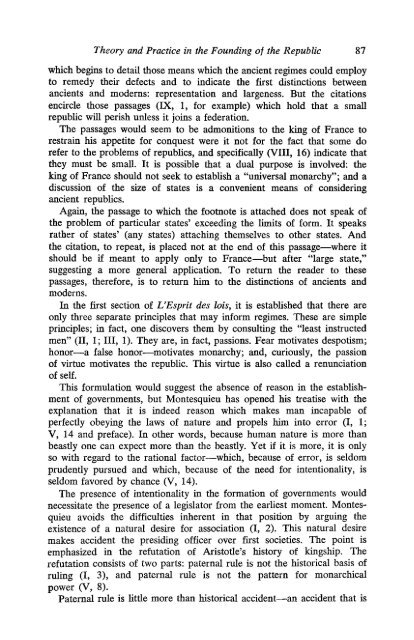philosophy - Interpretation
philosophy - Interpretation
philosophy - Interpretation
Create successful ePaper yourself
Turn your PDF publications into a flip-book with our unique Google optimized e-Paper software.
men"<br />
states'<br />
states'<br />
state,"<br />
Theory and Practice in the Founding of the Republic 87<br />
which begins to detaU those means which the ancient regimes could employ<br />
to remedy their defects and to indicate the first distinctions between<br />
ancients and moderns: representation and largeness. But the citations<br />
encircle those passages (IX, 1, for example) which hold that a smaU<br />
republic wiU perish unless it joins a federation.<br />
The passages would seem to be admonitions to the king<br />
of France to<br />
restrain his appetite for conquest were it not for the fact that some do<br />
refer to the problems of republics, and specif icaUy (VIII, 16) indicate that<br />
they must be smaU. It is possible that a dual purpose is involved: the<br />
king of France should not seek to establish a "universal monarchy"; and a<br />
discussion of the size of states is a convenient means of<br />
considering<br />
ancient repubhcs.<br />
Again, the passage to which the footnote is attached does not speak of<br />
the problem of particular<br />
rather of<br />
exceeding the limits of form. It speaks<br />
(any states) attaching themselves to other states. And<br />
the citation, to repeat, is placed not at the end of this passage<br />
should be if meant to apply only<br />
suggesting<br />
to France<br />
but after "large<br />
where it<br />
a more general application. To return the reader to these<br />
passages, therefore, is to return him to the distinctions of ancients and<br />
moderns.<br />
In the first section of L'Esprit des lois, it is established that there are<br />
only three separate principles that may inform regimes. These are simple<br />
the "least instructed<br />
principles; in fact, one discovers them by consulting<br />
(II, 1; III, 1). They are, in fact, passions. Fear motivates despotism;<br />
honor a false honor motivates monarchy; and, curiously, the passion<br />
of virtue motivates the republic. This virtue is also caUed a renunciation<br />
of self.<br />
This formulation would suggest the absence of reason in the establish<br />
ment of governments, but Montesquieu has opened bis treatise with the<br />
explanation that it is indeed reason which makes man incapable of<br />
perfectly obeying the laws of nature and propels him into error (I, 1;<br />
V, 14 and preface). In other words, because human nature is more than<br />
beastly one can expect more than the beastly. Yet if it is more, it is only<br />
so with regard to the rational factor which, because of error, is seldom<br />
prudently pursued and which, because of the need for intentionality, is<br />
seldom favored by chance (V, 14).<br />
The presence of intentionality in the formation of governments would<br />
necessitate the presence of a legislator from the earliest moment. Montes<br />
quieu avoids the difficulties inherent in that position<br />
by arguing the<br />
existence of a natural desire for association (I, 2). This natural desire<br />
makes accident the presiding<br />
officer over first societies. The point is<br />
emphasized in the refutation of Aristotle's history<br />
of kingship. The<br />
refutation consists of two parts: paternal rule is not the historical basis of<br />
ruling (I, 3), and paternal rule is<br />
power (V, 8).<br />
not the pattern for monarchical<br />
Paternal rule is httle more than historical accident an accident that is
















